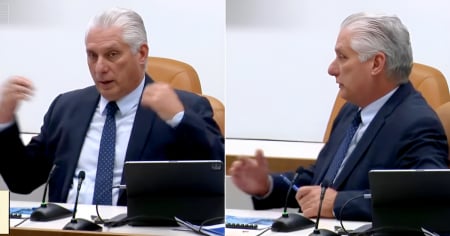A government-aligned journalist from Sancti Spíritus completely caught a leader off guard during an interview by asking him to mention five positive aspects of the Tarea Ordenamiento.
Elsa Ramos, from the local station, has a program on Mondays called "The Economy Has a Name," in which she has dedicated three episodes to understanding the so-called Ordering Task and its effects on the population.
Last week, Elsa assigned Frank Rafael Quesada Espinosa, a graduate in Economics, the task of finding five positive aspects of the Ordering.
This Monday, the host started the segment by saying that listeners "criticized" her for assigning such a complicated task to the expert. Because it's difficult to find five benefits, she joked, "I should have left it at three."
The debate was only just beginning.
Elsa questioned the defense made by the specialist regarding the supposed improvement in the sugar industry since the new measures were implemented. According to Quesada Espinosa, previously, when Cuba exported sugar, it only earned one dollar for every peso exported, which resulted in losses.
The interviewer's response was decisive.
"However, in practice, today we are exporting less than we did four years ago. And sugar is out of the question, because we haven't even received the two pounds from the store. It’s hard to see how this is a benefit for exportation; today we are exporting less than we did years ago," he criticized.
The publication by Radio Sancti Spíritus has generated hundreds of comments.
"Congratulations to that journalist who was able to tie that executive's tongue, incapable of solving any problems in his company," said a user.
"Everything is just blah blah blah and talk, and the little room remains the same," expressed another.
"Does anyone know if the host of Radio Sancti Spíritus is still there?... after asking her guest for five benefits of the Ordenamiento Task, and also telling him: how is the sugar industry a benefit for exports if there is no sugar?" noted on Facebook by Edmundo Dantés Junior's profile.
"This must be a setup: 'Critical journalism in Cuba?!' They'd sooner give out beef at the store," remarked a third person.
"Neither do they have answers to anything they do," pointed out a young man.
"That 'Task,' like all the previous and subsequent ones, has brought no benefits; it has only led the people into the deepest misery while the PCC leaders have become the millionaire elite of Cuba," asserted another internet user.
"The guy only uses phrases like 'we won', but he can't say anything coherent, the same old script for everyone. Send in comrade Lindoro; he does it better, for sure," suggested another with irony.
Other official journalists have echoed the discontent felt by the vast majority of the population regarding issues such as the decline in purchasing power and the rise in prices.
Last year, Jesús Álvarez López, a reporter for the Villa Clara network CMHW with 40 years of service, erupted against the constant rise in food prices, especially those coming from the countryside.
What can a retiree with 1,528 pesos buy today, if even yucca, sweet potatoes, pumpkins, and flour have been stripped of their historical modesty?" he questioned.
Economist Pedro Monreal is convinced that the economic "reorganization" designed by the government represented a brutal compression of workers' wages, leading to widespread impoverishment.
Monreal has criticized the Ministry of Economy and Planning for attributing the decline in the purchasing power of wages and pensions solely to external factors such as the economic "blockade" and the Covid-19 pandemic.
According to the expert, the relative decrease in salaries and contributions to social security reflects mistakes that have not been corrected, leading to a discrepancy between income and increases in consumer prices.
Frequently Asked Questions about the Organizational Task and the Economic Situation in Cuba
What are the benefits of the Ordering Task in Cuba?
The journalist Elsa Ramos asked a Cuban leader to mention five benefits of the Tarea Ordenamiento, but the expert was unable to list any clear advantages. The Tarea Ordenamiento has been widely criticized for not providing tangible benefits to the Cuban population. Some attempts at defense cite improvements in sectors such as the sugar industry, but the reality shows that sugar exports have decreased.
How has the Tarea Ordenamiento impacted the lives of Cubans?
The Task of Ordering, implemented in Cuba, has had a negative impact on the lives of many families. 89% of Cuban families are living in extreme poverty due to inflation, the removal of subsidies, and the rise in prices that have accompanied this process. The measure has been widely criticized for failing to meet its original goals and for exacerbating the economic crisis in the country.
Why is the partial dollarization of the economy in Cuba controversial?
The partial dollarization of the Cuban economy has generated criticism because most Cubans do not earn income in dollars, which limits their access to basic products in stores that only accept this currency. The measure, perceived as an attempt by the government to raise foreign currency, has increased economic inequality and has been criticized for failing to deliver on promises to supply the market in the national currency.
Filed under:
